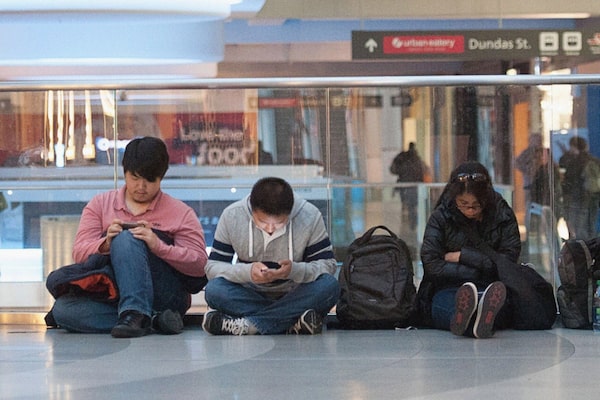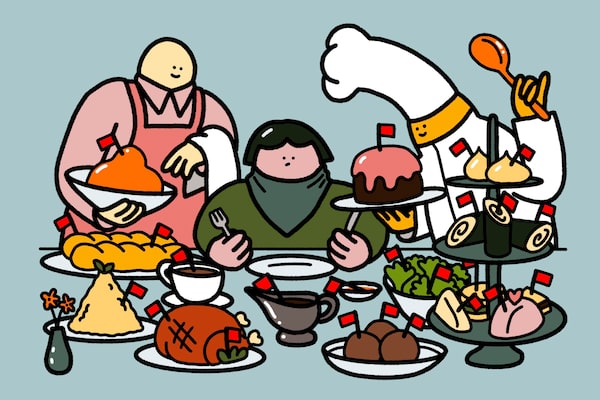Good morning, and welcome to the weekend.
Grab your cup of coffee or tea and sit down with a selection of this week’s great reads from The Globe.
Atop the Peace Tower on Parliament Hill, the Canadian flag flew at half-mast. The business of the House of Commons was halted. In provincial capitals and on Bay Street, memories of a former national leader were shared. Across the world, critical moments in international alliances were remembered. Back home, plans for a state funeral were unfolding.
Yesterday marked the first full day of mourning for Canada’s 18th Prime Minister, Brian Mulroney, who died Thursday at age 84 in the company of family. This weekend’s Globe and Mail has a breadth of coverage fit for a leader of long tenure whose influence on the country cannot be overstated.
“Mr. Mulroney was no incrementalist,” The Globe’s Editorial Board writes. “He amassed great political capital and was not afraid to spend it – indeed, sometimes he overspent. Under his watch, the Canadian economy was transformed. This country’s standing as a middle power reached its modern zenith. And without him, the Liberals would not have been able to stabilize federal finances in the 1990s.
“Along the way, he showed how conservative policies can make the country, and the world, a better place.”
If you’re reading this on the web, or it was forwarded to you from someone else, you can sign up for Great Reads and more than 20 other Globe newsletters on our newsletter sign-up page. If you have questions or feedback, drop us a line at greatreads@globeandmail.com.
Brian Mulroney: A life and legacy
Fred Lum/The Globe and Mail
Brian Mulroney’s political legacy stretches into the present day, and across every region of the land. And the land is a good place to start, since Mulroney has been credited with pushing forward environmental protection measures while in office, ahead of his time and against the grain of modern conservative politics. On the world stage, he promoted free trade and worked with U.S. presidents to make it foundational to the bilateral relationship and help refocus the Canadian economy, and he stood up to Margaret Thatcher while spearheading an anti-Apartheid movement within the Commonwealth. Domestically, he won an unheard-of two majorities for the PCs, reached out to the West and introduced the GST, for better or worse. He built a career in his home province of Quebec, then reshaped business there while PM and urged the voters of the province to agree to sign on to the constitution (inadvertently stoking separatism, but also lasting respect).
The date of Mulroney’s state funeral has not been announced, but it will have the attention of political observers from all parties and all regions of Canada.
For generations of teens, malls meant freedom. But as they decline, are they really worth mourning?

In-person interactions have declined steadily in every single American demographic since the 1970s, a U.S. time use survey shows.Hannah Yoon/The Canadian Press
We’re losing malls, and with them the backdrops for many of our coming-of-age stories. But today’s youth loneliness crisis can’t simply be attributed to the loss of these places free of the supervision inherent at home or at school. Instead, writes author Kate Black, the decline of malls may have been the canary in the coal mine for the real problem.
Y-Foundation housing projects in Helsinki, Finland.Y-Foundation
Solutions to Canada’s housing crisis can be hard to find when arguments about supply, demand, government policy and free-market behaviours dominate the conversation. But by casting a wide net internationally, Gregor Craigie argues there are valuable lessons to be learned by studying successful initiatives found in France, Singapore and Finland.
More: The Globe presents op-eds from the five finalists for this year’s Lionel Gelber Prize, awarded to the world’s best English non-fiction book on foreign affairs:
- How scarcity pushes globalization
- AI is hungry for your data
- It is not too late to pivot the development of AI in a more pro-human direction
- What comes after the post-Wall world?
- Canada needs to start preparing for Trump – and getting other allies involved
An inside look at how the National Ballet produces its slippers for Alice’s Adventures in Wonderland
Lacey Hammond Harrington paints a ballet shoe with hand-mixed dye at the National Ballet of Canada.Sarah Palmer/The Globe and Mail
When the National Ballet revives its production of Alice’s Adventures in Wonderland this month, the spotlight will be on the grace and movement of the dancers. But dancers rely on their shoes, and Alice requires 284 pairs to outfit more than 70 dancers in a dizzying palette of colours to match the lavish costumes, all prepared by footwear co-ordinator Lacey Hammond Harrington.
Dining out with food allergies: Who’s responsible for your safety?

Illustration by Allison & Cam
Everyone deserves to feel safe eating out. Asking diners about allergies seems the first and most obvious step to fostering that feeling. But recent trends, from an uptick in takeout orders since pandemic lockdowns to a global rise in food allergies, have made matters more complicated: Who is ultimately responsible for ensuring food allergy requests are handled with the appropriate care at restaurants?
With a nudge from Oprah, interior designer Jeremiah Brent explores the essence of home
Jeremiah Brent is an interior designer, TV personality and author of The Space That Keeps You: When Home Becomes a Love Story.Paolo Abate/Supplied
As a designer, explorations of the idea of home should be rooted in visuals and aesthetics. At least, that’s what a book publisher might expect, but when Jeremiah Brent embarked on such a project, “I told them it’s a design book, but it has nothing to do with design. … I wanted it to be an emotional design book, not a pretty design book.”
Finally, take this week’s quiz testing your knowledge of arts and culture news.
Sample question: Lord of the Rings stars Dominic Monaghan and Billy Boyd, who played hobbits Merry and Pippin, have reunited to share the lead in which play?
a. Samuel Beckett’s Waiting for Godot
b. Tom Stoppard’s Rosencrantz and Guildenstern are Dead
c. Harold Pinter’s The Dumb Waiter
d. Václav Havel’s The Memorandum
We also have weekly quizzes for business and news readers. Try them!